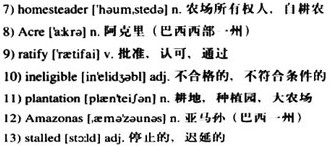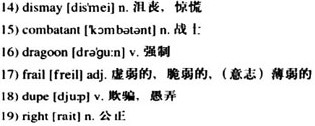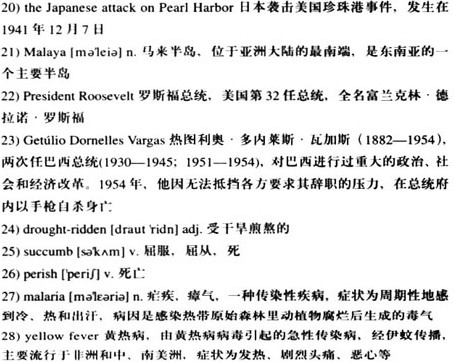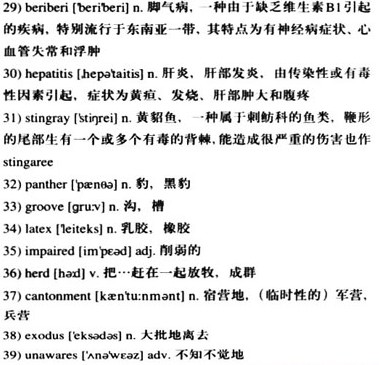文字难度:★★★☆
Alcidino dos Santos was on his way to the mar-ket to buy vegetables for his mother one morning in 1942 when an army officer stopped him and told him he was being 2)drafted as a “rubber soldier.” Men were needed in the Amazon, 3,000 miles away, to harvest rubber for the 3)Allied war effort, he was told, and it was his 4)patriotic duty to serve.
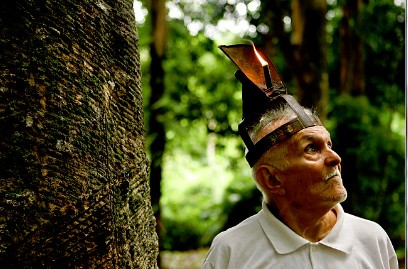
Mr. dos Santos, then a 19-year-old5)mason’s assistant, protested that his mother was a widow who depended on him for support, but6)to no avail. He would be paid a wage of 50 cents a day, he recalls being told, and receive free transportation home once the conflict was over, but he had to go, that day.
But those who, right away, heard the news that the war had ended also encountered problems in leaving and collecting their wages. Many were told that they owed money to the rubber camp bosses for food, clothing or equipment, and would have to remain until their debts were paid off.
“Oh, I was so happy the day the war ended, because I thought, ‘Now I can finally go home,’ “ Mr. dos Santos recalled. “But when I went to talk to the boss about leaving, he said, ‘Who are you kidding?’ and told me to get back to work.”
With no money and no transportation, most of the rubber soldiers resigned themselves to remaining in the Amazon. They married, had families and continued to work in the rubber camps or became rural 7)homesteaders, ignored and anonymous.
“How do you suppose Brasilia was built?” said Jos— Paulino da Costa, director of the Retirees’ and Rubber Soldiers’ Union of 8)Acre. “The United States paid money to Brazil, but it went to other projects instead of the rubber soldiers, which was a terrible injustice.”
1942年的一天早上,Alcidino dos Santos 正走在去市场为母亲买蔬菜的路上,这时一个军官截住他,告诉他说,他已作为“橡胶兵”被征召入伍。他还得知,3000英里(约482.7万米)以外的亚马逊河地区需要人力来收割橡胶,支援二战同盟国,入伍是爱国者义不容辞的职责。
那时只有19岁的dos Santos 先生是一名泥瓦匠的帮工,他反抗着说他母亲守寡,生活全靠他一个人,但这些话都没有用。他回忆起自己当时还被告知,他将获得50美分(约4元)的日薪,并且只要战争一结束,他将被免费送回家,但他必须当天就动身。
但那些及时得知战争结束这个消息的人想要走想要领取工资,也遇到了障碍。他们中很多人都被告知,因为食物、衣服或设备的费用,他们还欠橡胶营老板的钱,他们必须留下来,直到还清债务为止。
“噢,停战那天我真兴奋,因为我以为‘我现在终于可以回家了。’”dos Santos 先生回忆到,“但当我去跟老板说我要走的时候,他说:‘你想戏弄谁呀?’然后叫我回去工作。”
没有钱也没有还乡的交通工具,大多数的橡胶兵只好听天由命,继续留在亚马逊河地区。他们在当地结婚、建立家庭、继续待在橡胶营干活,或者成为乡村自耕农,被人忽略,默默无闻。
“你猜想巴西利亚是怎么建起来的?”阿克里州退休人员及橡胶兵联盟的负责人Jos?Paulino da Costa说,“美国付钱给巴西,钱却被挪用到其他项目上去,没有支付给橡胶兵,这太不公平了。”
In 1988 though, Brazil 9)ratified a new Constitution with an article that called for the rubber soldiers to receive a pension valued at twice the minimum wage, or $350 a month. But many who served there found themselves 10)ineligible because they could not supply the required documents. Their original contracts had been lost, destroyed by rain or handed over to rubber 11)plantation bosses and never returned.
Those who have qualified receive a pension that is barely one-tenth of the amount paid to Brazilian soldiers who fought in Europe during World War II. In 2002 a member of Congress from the state of 12)Amazonas introduced a bill to pay rubber soldiers “who are living in misery” the same amount, but the bill remains 13)stalled in committee.
“When I watch the ceremonies on television and see the soldiers who fought in Europe parading in their uniforms I feel sadness and14)dismay,” Mr. Maia said. “We were 15)combatants too. Everyone owes us a big favor, including the Americans, because that war couldn’t have been won without rubber and us rubber soldiers.”
More than 60 years after the end of World War II, Mr. dos Santos and hundreds of other poor Brazilians who were 16)dragooned into service as rubber soldiers are still in the Amazon, waiting for those promises to be fulfilled. Elderly and 17)frail, they are fighting against time and indifference to gain the recognition and compensation they believe should be theirs.
尽管在1988年,巴西政府通过了新宪法,其中一条规定让橡胶兵获得两倍于国家规定的最低工资的抚恤金——每月350美元(约2800元)。但曾在橡胶园服役的许多人发现,由于无法出具必须的文件,他们没有资格领取抚恤金。他们的合同原件已经丢失,不是被雨水毁坏了,就是上交给了橡胶园老板,从此没被归还。
那些符合条件的人获得的抚恤金,只相当于二战在欧洲战场上打仗的巴西士兵所获得的抚恤金的1/10。2002年,亚马逊州的一个议员提出了一个议案,要求向那些生活在困苦中的橡胶兵支付与欧战士兵相同数额的抚恤金,但这个议案在委员会里迟迟没有结果。
“当我在电视里看到那些曾在欧洲打仗的士兵穿着军服游行欢庆时,我感到很伤心,很沮丧。”Maia 先生说,“我们也是战士啊。每个人都欠我们一个大人情,包括美国人,因为如果没有橡胶,没有我们这些橡胶兵,他们在二战中就不可能获胜。”
二战结束60多年了,dos Santos 先生以及其他数百名曾被强征为橡胶兵的贫苦巴西人仍然待在亚马逊河地区,等待着那些承诺被履行。他们年迈体衰,为赢得承认以及自信应得的赔偿,与时间和冷漠做着顽强的斗争。
“We were 18)duped, and then abandoned and forgotten,” Mr. dos Santos, who never saw his mother again, said in an interview at his simple wood house here in Acre, a state in the far west of the Brazilian Amazon that has the largest concentration of former rubber soldiers.
“We were brought here against our will,” he said, “and thrown into the jungle, where we suffered terribly. I’m near the end of my life, but my country should do 19)right by me.”
The program originated in an agreement between the United States and Brazil. 20)The Japanese attack on Pearl Harbor had cut the United States off from its main source of rubber, in 21)Malaya, and 22)President Roosevelt persuaded Brazil’s dictator, 23)Getœlio Dornelles Vargas, to fill that strategic gap in return for millions of dollars in loans, credits and equipment.
According to Brazilian government records, more than 55,000 people, almost all of them from the 24)drought-ridden and poverty-stricken northeast, were sent to the Amazon to harvest rubber for the war effort. There are no official figures on how many of them 25)succumbed to disease or animal attacks, but historians estimate that nearly half 26)perished before Japan surrendered in September 1945.
“Some of the guys died of 27)malaria, 28)yellow fever, 29)beriberi and 30)hepatitis, but others were killed by snakes, 31)stingrays or even 32)panthers,” recalled Lup—rcio Freire Maia, 86. “They didn’t have the proper medicines for diseases or snakebites there in the camps, so when someone died you buried him right there next to the hut and kept right on working.”
“我们先是被骗,然后被抛弃,被遗忘。”从此再没见到母亲的dos Santos 先生,在他那位于阿克里州的简陋木屋里接受采访时说道。阿克里州在亚马逊河流域巴西段的极西部,是以前大多数橡胶兵的聚居地。
“我们是被迫来到这里的,”他说。“而且被扔进丛林里,受了许多磨难。我快走完这一生了,但我的祖国应该公正地对待我。”
橡胶园项目来源于美国和巴西之间的一个协议。日本袭击珍珠港,截断了美国位于马来半岛的主要橡胶供给渠道后,罗斯福总统说服了巴西独裁者热图利奥·多内莱斯·瓦加斯出手弥补美国在战略上的缺陷,并以数百万美元的贷款、赊欠和装备作为报酬。
根据巴西官方的记录,超过5.5万人被派到亚马逊河地区收割橡胶支援战争,他们大多来自巴西受干旱和贫穷煎熬的东北地区。虽然没有官方的数据显示其中有多少人死于疾病或者野兽的攻击,但历史学家估计,将近一半的人在1945年9月日本投降以前已经死去。
“一些人死于瘴气、黄热病、脚气病和肝炎,但另一些人是被蛇、黄貂鱼,甚至是黑豹咬死的。”86岁的Lup巖cio Freire Maia 回忆道,“他们在橡胶园里没有合适的药物治疗这些疾病或被蛇咬的伤口。所以死了人,你就得把他埋到屋旁,然后继续工作。”
The work was exhausting, dangerous and unhealthy. Rubber soldiers rose just after midnight, tramped through the jungle in the dark to cut 33)grooves in the trees and returned later in the day to collect the 34)latex that dripped into cups.
They would then toast the white liquid into solid balls weighing up to 130 pounds, a process that gene-rated so much smoke that many were left blind or sight-35)impaired.
Though many of the rubber soldiers were forced into service, a few enlisted, hoping for adventure and riches. Jos— Araœjo Braga, 82, described himself as “a rebellious kid who wanted to see the world” and thus was easily swayed by government propaganda that spoke of the Amazon as a place where the “Rubber for Victory” effort could earn a hard worker a fortune.
“I could have joined the army and gone to Europe, where Brazilian troops fought alongside American forces in Italy and are now honored as heroes,” he said. “But I chose the Amazon because, foolish me, I thought that I could make a lot of money.”
Once the men reached the Amazon though, their wages ceased and they were 36)herded into 37)cantonments, with no visitors allowed.
When the war ended, the people profiting from the arrangement were not about to let their free labor go. The rubber camp bosses “feared an 38)exodus if the news got out, and so many rubber soldiers were still there in the jungle years later, 39)unawares,” said Marcos Vin’cius Neves, a historian who is director of a government historical preservation foundation there.
Mr. Maia said, “It wasn’t until 1946 that I learned that the war was over. We didn’t have any radios, and we were completely cut off from the outside world.”
那些工作劳累不堪、充满危险并且损害健康。橡胶兵一过午夜就得起床,摸黑走过丛林给树开槽,稍后天亮了,他们再回去收集已滴进杯里的乳汁。
然后,他们把白浆烘成重达130磅(约59千克)的固体球,这道工序会产生大量的烟,导致很多人失明或视力受损。
虽然很多橡胶兵是被迫入伍的,也有一些渴望冒险和财富的人自愿参加。82岁的Jos?Ara渏o Braga 称当年的自己是“一个想出去看世界的叛逆小子”,因此很容易就被政府的宣传所打动。政府把亚马逊河地区描绘为一个你只要卖力干,努力实现“以橡胶取胜”,就能赚到一大笔钱的地方。
“我本来可以加入巴西陆军,到欧洲去,在意大利与美国的军队并肩作战,现在被人称为英雄的。”他说,“但我选了亚马逊,我真傻,我以为我会赚到很多钱。”
然而橡胶兵一到达亚马逊河地区,工资就停发了,他们被成群地赶到宿营地,不许任何人探访。
二战结束后,那些凭借橡胶园获利的人并不打算放走他们的免费劳动力。橡胶园的老板“担心关于战争结束的消息走漏会导致大批的人离去,所以多年后还有那么多的橡胶兵待在丛林里,浑然不知。”历史学家、政府下属的历史保护基金会的负责人Vin抍ius Neves说道。
Maia 先生说:“直到1946年我才知道战争结束了。我们没有任何广播,完全与外界隔离了。” 

